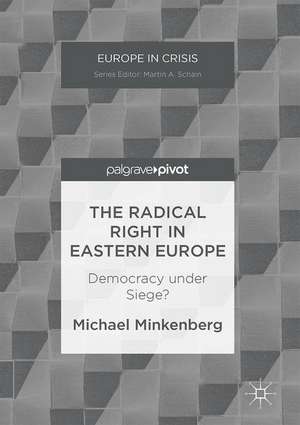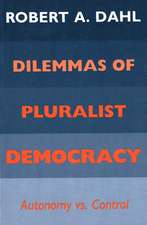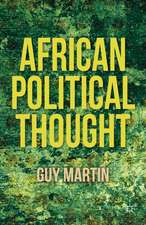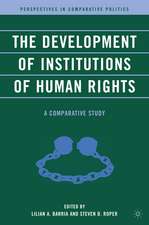The Radical Right in Eastern Europe: Democracy under Siege?: Europe in Crisis
Autor Michael Minkenbergen Limba Engleză Hardback – 8 mai 2017
Preț: 420.97 lei
Nou
Puncte Express: 631
Preț estimativ în valută:
80.56€ • 86.14$ • 67.16£
80.56€ • 86.14$ • 67.16£
Carte tipărită la comandă
Livrare economică 17 aprilie-01 mai
Preluare comenzi: 021 569.72.76
Specificații
ISBN-13: 9781349951475
ISBN-10: 1349951471
Pagini: 100
Ilustrații: XX, 194 p. 5 illus.
Dimensiuni: 148 x 210 x 14 mm
Greutate: 0.41 kg
Ediția:1st ed. 2017
Editura: Palgrave Macmillan US
Colecția Palgrave Pivot
Seria Europe in Crisis
Locul publicării:New York, United States
ISBN-10: 1349951471
Pagini: 100
Ilustrații: XX, 194 p. 5 illus.
Dimensiuni: 148 x 210 x 14 mm
Greutate: 0.41 kg
Ediția:1st ed. 2017
Editura: Palgrave Macmillan US
Colecția Palgrave Pivot
Seria Europe in Crisis
Locul publicării:New York, United States
Cuprins
Abbreviations
List of Figures
List of Tables
Acknowledgments
Introduction
1.Concepts: Analyzing the East European Radical Right
a)A Concept of the Radical Right in Comparative Perspective
b)Conceptual Enlargement: the Radical Right and the East European Context
c)Modeling the Mobilization and Interaction of the Radical Right
2.Contexts: Legacies and the Transformation Process
a)The Return of the Past or the Return to Europe - the Question of Legacies
b)Cultural Context: Nation Building and Nationalism
c)Structural Context: Regime Change and Modernization
3.Contents: Organizational Patterns and Ideological Profiles
a)Mapping the Radical Right in the Region
b)Ideology – Assessing the Democratic Quality
c)vement Sector and Violence4.Configurations: Mobilization and Performance
a)Parties and Elections – Fluidity and Continuity
b)Patterns of Change – the Role of Differentiation
c)Patterns of Interaction
5.Consequences: Interaction and Impact
a)At the Top: Government Participation
b)Interaction Effects
c)Policy Shifts
Conclusions
Bibliography
Recenzii
Notă biografică
Michael Minkenberg is Professor of Political Science at European University Viadrina in Frankfurt (Oder), Germany. He had previously held the Max Weber Chair for German and European Studies at New York University, USA. His research interests include the radical right in liberal democracies and the relationship between religion and politics in Western societies.
Textul de pe ultima copertă
This book is a comparative analysis of the post-communist East European radical right, both in party and non-party formation, using the West European radical right as a baseline. Minkenberg offers insights into the political field of the radical right since the onset of democracy in the region and elicits region-wide and country-specific characteristics. The book argues that due to the nature of the transition process from Soviet hegemony to national independence and from communist to democratic societies, and the unfinished process of nation-building in the region, the radical right in Eastern Europe is a phenomenon sui generis, both organizationally more fluid and ideologically more extreme than the Western counterpart. The issues covered include trends in party system and electoral developments, patterns of movement mobilization and racist activism, and the impact of the radical right on their countries’ politics and policies.
Michael Minkenberg is Professor of Political Science at European University Viadrina in Frankfurt, Germany. He had previously held the Max Weber Chair for German and European Studies at New York University, USA. His research interests include the radical right in liberal democracies and the relationship between religion and politics in Western societies.
Caracteristici
Provides a timely account of recent radical right movements, political parties, electoral competition, and governance in Eastern Europe
Incorporates quantitative and qualitative data, drawing on perspectives form comparative and historical sociology, electoral research, and analysis of public opinion trends
Offers a historical analysis of key conditions and legacies that have impacted and shaped the current nature of democracies in Eastern Europe
Incorporates quantitative and qualitative data, drawing on perspectives form comparative and historical sociology, electoral research, and analysis of public opinion trends
Offers a historical analysis of key conditions and legacies that have impacted and shaped the current nature of democracies in Eastern Europe






















